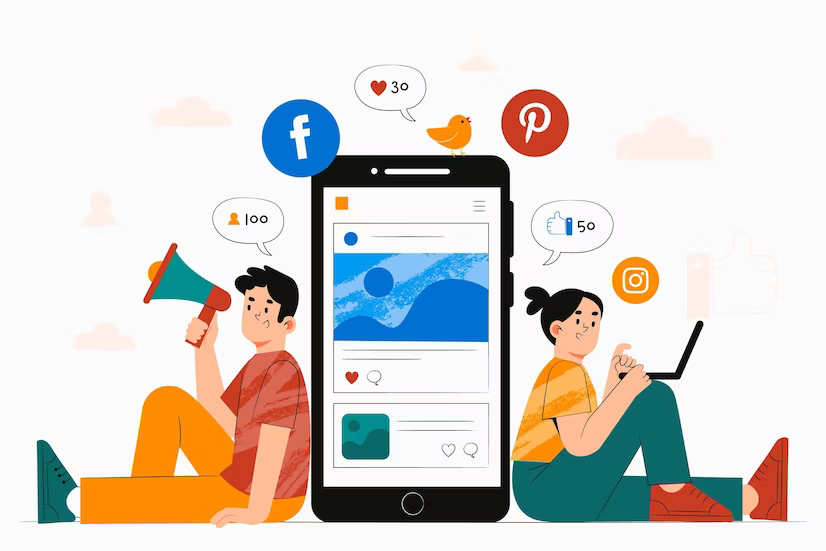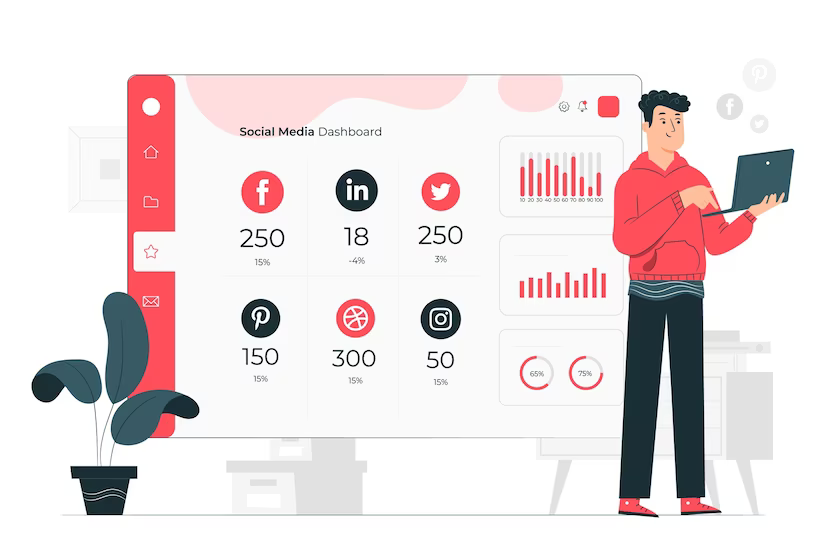
In today’s digital age, social media has transformed the marketing landscape.
It has become integral to any successful digital marketing strategy, offering businesses unparalleled opportunities to connect with their target audience, build brand awareness, and drive business growth.
Social media platforms such as Facebook, Instagram, Twitter, LinkedIn, and YouTube have evolved into powerful tools that allow businesses to reach a wider audience and engage and interact with them on a deeper level.
The importance of social media in digital marketing cannot be overstated. It has revolutionized how businesses communicate, promote their products or services, and build customer relationships.
In this blog post, we will explore social media’s significant role in digital marketing and why businesses must embrace its power to stay competitive in today’s fast-paced, interconnected world.
We will delve into the various benefits and advantages that social media brings to the table, including its ability to amplify brand visibility, enhance customer engagement, drive website traffic, and facilitate targeted advertising.
Furthermore, we will explore how social media allows businesses to gather valuable insights about their target audience, track campaign performance, and adapt their marketing strategies in real time for optimal results.
As we embark on this journey through the realm of social media in digital marketing, we will uncover practical tips, best practices, and real-life examples of businesses harnessing the power of social media to achieve their marketing goals.
Whether you are a startup entrepreneur, a small business owner, or a marketing professional, this blog post will provide valuable insights and actionable strategies to leverage social media effectively and elevate your digital marketing efforts.
The Reach and Influence of Social Media

Social media platforms have transformed how we communicate, connect, and access information.
With their huge user bases and global reach, social media platforms offer businesses an unprecedented opportunity to connect with a vast audience and exert influence.
In this section, we will delve into the reach and influence of social media, highlighting its significance in today’s digital landscape.
Social media platforms such as Facebook, Twitter, Instagram, LinkedIn, and YouTube have amassed billions of active users worldwide.
These platforms serve as virtual communities where people share ideas, opinions, experiences, and content in various forms. This extensive user base presents businesses with an enormous potential reach that was previously unimaginable.
According to Ken Savage, the reach of social media extends beyond geographical boundaries, allowing businesses to connect with individuals from all corners of the world.
It breaks down barriers of time and distance, enabling real-time interactions and instant dissemination of information.
This global reach is particularly advantageous for businesses that aim to expand their customer base, enter new markets, or establish an international presence.
Moreover, social media platforms have become influential sources of information and recommendations.
People often turn to social media to seek advice, gather insights, and make informed decisions. They rely on the experiences and opinions shared by their connections and the influencers they follow.
This social media aspect, known as social proof, greatly impacts consumer behavior and purchasing decisions.
The Importance of Social Media In Digital Marketing
In a nutshell, social media can be used for
- Brand awareness
- Customer engagement
- Lead generation
- Traffic generation
- Customer support
- To get UGC
- Advertising
- Targeting
- Integrations
And so on.
Below, we will explain more about the possibilities so you can implement them in your business and get better results.
Building Brand Awareness and Recognition

Brand awareness and recognition are crucial aspects of any successful marketing strategy. In a highly competitive marketplace, businesses must establish a strong presence and make their brand known to their target audience.
Social media platforms have emerged as powerful tools for building brand awareness and recognition. This section will explore how businesses can leverage social media to achieve these goals.
Brand awareness refers to the extent to which a target audience recognizes and associates a particular brand with its products or services.
It is about creating familiarity and ensuring that your brand comes to mind when consumers consider a specific industry or product category.
Brand recognition, on the other hand, focuses on the ability of consumers to identify a brand by its visual elements, such as logos, colors, and slogans.
Through regular and strategic content sharing, businesses can create a strong brand presence on social media. This involves creating content that is relevant, informative, and aligns with the interests of the target audience.
By providing valuable insights, solving problems, or entertaining their followers, businesses can position themselves as trusted sources of information and build credibility.
Engaging with the Target Audience

Social media fosters two-way communication between businesses and their customers. It provides a platform for companies to listen to their audience, understand their needs, and promptly respond to their queries or feedback.
By engaging with the target audience through comments, messages, and social media groups, businesses can build trust and loyalty among their customers.
To effectively engage with the target audience on social media, businesses can employ several strategies:
1) Be Responsive
Promptly respond to comments, messages, and inquiries from the target audience. Show that you value their input and are committed to providing excellent customer service.
2) Encourage Dialogue
Create opportunities for two-way communication by asking questions, seeking feedback, and initiating discussions. Encourage followers to share their thoughts and opinions on relevant topics.
3) Provide Valuable Content
Share informative, educational, and entertaining content that addresses the needs and interests of the target audience. Offer solutions to their problems, provide tips and advice, and share industry insights.
4) Personalize Interactions
Treat each interaction as an opportunity to build a personal connection. Use personalization techniques to address followers by name and tailor responses to their queries or concerns.
5) Use Storytelling
Incorporate storytelling into your social media posts to captivate and engage the target audience. Share authentic and relatable stories that resonate with their experiences and emotions.
Driving Website Traffic and Lead Generation

Social media acts as a gateway to businesses’ websites, driving valuable traffic and generating leads. By strategically sharing links to their website or landing pages, companies can attract potential customers interested in their products or services.
With compelling call-to-actions and lead-capture forms, social media can be a powerful lead-generation tool.
Enhancing Customer Service and Support

Customer service and support play a pivotal role in building strong customer relationships and ensuring customer satisfaction.
With the advent of social media, businesses now have additional channels to enhance their customer service efforts.
In this section, we will explore the importance of enhancing customer service and support on social media and how businesses can effectively leverage these platforms.
Customer service on social media goes beyond traditional methods such as phone calls or email. It allows businesses to provide real-time assistance, resolve issues promptly, and engage with customers on a public platform.
Here are some key reasons why enhancing customer service and support on social media is vital:
1) Accessibility and Convenience
Social media platforms provide customers a convenient and accessible way to seek assistance. Customers can contact businesses through direct messages, comments, or dedicated support channels.
This accessibility helps in addressing their concerns quickly and efficiently.
2) Real-Time Responses
Social media enables businesses to provide immediate responses to customer queries or complaints. This real-time interaction demonstrates that the company values its customers’ time and is committed to resolving issues promptly.
Quick responses help in building trust and improving customer satisfaction.
3) Public Transparency
Addressing customer queries or complaints on social media showcases transparency and accountability. Other customers can witness the business’s responsiveness and commitment to resolving issues.
By providing public solutions, businesses can enhance their reputation and demonstrate their dedication to customer service.
4) Brand Reputation Management
Social media plays a significant role in shaping a brand’s reputation. By actively engaging with customers, businesses can manage and mitigate any negative experiences or feedback.
Addressing customer concerns publicly showcases the business’s willingness to listen and resolve issues, positively impacting its reputation.
Harnessing User-Generated Content

User-generated content (UGC) refers to any form of content, such as reviews, testimonials, photos, videos, or social media posts, created and shared by consumers or users of a product or service.
Harnessing user-generated content has become a powerful strategy for businesses to engage with their audience, build brand trust, and amplify their marketing efforts.
Let’s explore the importance of harnessing user-generated content and how businesses can effectively leverage it.
1) Authenticity and Trust
User-generated content is highly authentic and trusted by consumers. When individuals share their experiences and opinions about a product or service, it resonates with others seeking truthful information.
Harnessing UGC helps businesses build trust and credibility as potential customers view it as unbiased and reliable.
2) Social Proof
User-generated content serves as social proof, influencing the purchasing decisions of others. When people see their peers using and endorsing a product or service, it instills confidence and reduces perceived risk.
By showcasing UGC, businesses can tap into the power of social influence and drive conversions.
3) Increased Engagement
User-generated content encourages active participation and engagement from customers. When businesses involve their audience in creating content, it fosters a sense of community and strengthens the relationship between the brand and its customers.
UGC initiatives, such as contests, challenges, or hashtag campaigns, inspire users to interact with the brand and share their experiences.
4) Diverse Perspectives
Harnessing user-generated content allows businesses to showcase diverse perspectives and experiences.
Customers from different backgrounds, locations, or demographics can provide unique insights and broaden the brand’s appeal. This diversity helps connect with a wider audience and resonate with various customer segments.
5) Cost-Effective Marketing
User-generated content is a cost-effective way to generate compelling marketing materials.
Instead of investing in elaborate photo shoots or professional videos, businesses can leverage UGC to create authentic and relatable content. This reduces production costs while maintaining a high level of engagement.
Social Media Advertising and Targeting

Social media platforms offer powerful advertising tools that allow businesses to reach highly targeted audiences.
Through advanced targeting options, businesses can define specific demographics, interests, behaviors, and locations to ensure their ads are seen by the right people.
Social media advertising provides a cost-effective and measurable way to promote products or services and achieve specific marketing objectives.
Measuring and Analyzing Performance

The effectiveness of social media campaigns can be measured and analyzed using various metrics and analytics tools.
Businesses can track engagement levels, reach, click-through rates, conversions, and other key performance indicators.
These insights enable companies to refine their strategies, optimize their content, and make data-driven decisions to drive better results.
Integrating Social Media with Other Marketing Channels

Social media is most impactful when integrated with other marketing channels.
Businesses can create a cohesive and consistent brand presence across multiple platforms by aligning social media efforts with email marketing, content marketing, search engine optimization (SEO), and other digital marketing strategies.
Integration also enables cross-promotion, amplifying the reach and impact of marketing campaigns.
The Future of Social Media in Digital Marketing
As technology evolves, so will social media and its role in digital marketing. With the rise of artificial intelligence, virtual reality, and augmented reality, social media platforms will become even more immersive and personalized.
Businesses must adapt to these changes and stay updated with the latest trends and advancements to maintain a competitive edge.
Conclusion
Social media has become an indispensable tool in the world of digital marketing.
Its ability to connect businesses with a vast audience, build brand awareness, engage with customers, drive website traffic, and measure performance makes it a vital component of any marketing strategy.
To harness the full potential of social media, businesses must invest time and resources in developing a thoughtful and targeted approach.
We hope you have found this article helpful and enjoyed reading it. If you did, please consider sharing the article with your friends and fellow bloggers on social media.
If you are looking for more articles, check out our blog archive.
